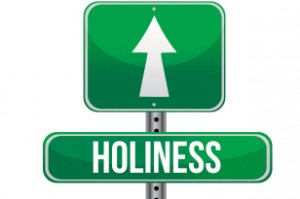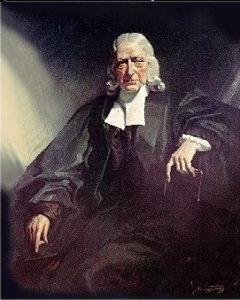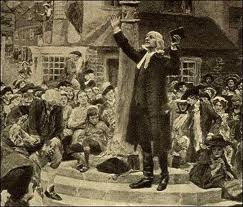John Wesley: The Whole of Christian Perfection
What is then the perfection of which man is capable while he dwells in a corruptible body? It is the complying with that kind command, ‘My son, give me thy heart.’ It is he ‘loving the Lord; his God with all his heart, and with all his soul, and with all his mind.’ This is the sum of Christian perfection: It is all comprised in that one word, Love. The first branch of it is the love of God: And as he that loves God loves his brother also, it is inseparably connected with the second: ‘Thou shalt love thy neighbor as thyself:’ Thou shalt love every man as thy own soul, as Christ loved us. ‘On these two commandments hang all the Law and the Prophets: These contain the whole of Christian perfection.
— John Wesley, Sermon # 76 “On Perfection.”
Many more John Wesley quotes on the topic of Christian Perfection can be found here: THE NATURE OF CHRISTIAN PERFECTION. And here’s a link that will take you to the Table of Contents of John Wesley’s own compilation of his teachings on this topic: A Plain Account of Christian Perfection.
Did John Wesley Ever Claim Christian Perfection?
It is often pointed out that John Wesley never openly claimed for himself the experience of entire sanctification (or Christian Perfection). And, that seems strange since this doctrine was the centerpiece of his theology of the Christian life. Lindström, in his chapter on Christian Perfection says:
The importance of the idea of perfection to Wesley is indicated by his frequent mention of it: in his sermons and other writings, in his journals and letters, and in the hymn books he published with his brother Charles. He never abandoned the general position with regard to Christian perfection which derives from his introduction to practical mysticism in 1725 and was then first expressed; it is a continuous theme in his sermons and books. The year before his death he says of it: “This doctrine is the grand depositum which God has lodged with the people called Methodists; and for the sake of propagating this chiefly He appeared to have raised us up.”
The point is often made. If this experience is so important — and if people are supposed to testify to what God has done in their life — than why doesn’t Wesley himself ever record in his Journal — or elsewhere — an experience he openly identified as “entire sanctification”? Randy Maddox says in his book Responsible Grace (in footnote 218 to Chapter 7):
Two Wesley Quotes on Christian Perfection
Todd Stepp, who blogs at Wesleyan/Anglican posted these comments from John Wesley on the Facebook Confessing Movement page:
The first one relates to a theme I was trying to get at by speaking of Christian Perfection as an Ecumenical Doctrine:
The PERFECTION I hold is so far from being contrary to the doctrine of our Church that it is exactly the same which every clergyman prays for every Sunday: ‘Cleanse the thoughts of our hearts by the inspiration of thy Holy Spirit, that we may PERFECTLY LOVE THEE, and WORTHILY MAGNIFY thy holy name.’
— John Wesley, “Answer to Rowland Hill’s Tract” in “The Works of John Wesley” vol. 9, p409.
Wesley refers here to the familiar Anglican Collect for Purity. This prayer was translated by Thomas Cramner from an 11th Century Latin prayer appearing in the Leofric missal.
Almighty God, unto whom all hearts be open, all desires known, and from whom no secretes are hid: cleanse the thoughts of our hearts by the inspiration of thy holy spirit, that we may perfectly love thee, and worthily magnify thy holy name: through Christ our Lord. Amen.
The point being that the experience of faith that he taught is nothing more than the fulfillment of that prayer. And, if we are going to pray it — shouldn’t we expect it?
This second quote is crucial to Wesley’s claims about Christian Perfection:
Thursday 21st, inquiring how it was that in all these parts we had so few witnesses of full salvation [i.e., entire sanctification; Christian perfection], I constantly received one and the same answer: ‘We see now, we sought it by our WORKS. We thought it was to come GRADUALLY. We never expected it to come in a moment, by simple FAITH, in the very same manner as we received justification.’ What wonder is it then that you have been fighting all these years ‘as one that beateth the air’?
— John Wesley, “Short History of People Called Methodists” in “The Works of John Wesley” Vol. 9, p. 475.
It is by faith and not by works. Trying harder will not make us better — it is always a matter of trusting more deeply. We do not begin in the Spirit and then work out our salvation in our own energy — it is by grace through faith from beginning to end.
Eradication of the Sin Nature? Huh?
I am about to launch into a rather long post — and one that will not be of interest to everyone. Nevertheless, because of the nature of this site, and because of the issues I commonly address and raise here, I need to post a statement — about a problem often encountered in the literature of the holiness movement. It is common in these writings to encounter the language of eradication: the eradication of “sin” or of “inward sinfulness” or of “inbred sin” or of “the sin nature” or of “the carnal nature” — or similar language. What is to be made of these claims?
 I have recently re-affirmed the purposes of this web site, saying: “I intend this as a site that is focused on the Wesleyan teachings about holy living.” I have often expressed my appreciation of the Holiness Movement and (to a lesser extent) the Pentecostal movement for the formative influence they had on shaping the earliest stages of my Christian journey.
I have recently re-affirmed the purposes of this web site, saying: “I intend this as a site that is focused on the Wesleyan teachings about holy living.” I have often expressed my appreciation of the Holiness Movement and (to a lesser extent) the Pentecostal movement for the formative influence they had on shaping the earliest stages of my Christian journey.
I maintain here a growing collection of resources on the holiness movement here — and hope to have more soon. I also maintain two blogs that feature the writings of nneteenth century holiness writers Daniel Steele and Thomas C. Upham. . All of this, I am presenting “as is.” I am seeking make this material accessible, so that people can grapple with these writings on their own — without having them filtered through my own opinions and evaluations of them.
I am a retired United Methodist pastor. I realize that the message of Christian Perfection / Entire Sanctification (the main theme of the Holiness Movement) is almost completely unknown among contemporary United Methodists. Many United Methodist pastors heard of this theme for the first time in their life while attending Seminary. (And, some who did may not have been paying attention that particular day.)
It has been my intention, from the beginning of this site, to raise up this particular part of the Wesleyan tradition — I am not seeking to indoctrinate anyone in anything — I am raising an issue that (I believe) needs re-consideration and re-appropriation. My personal reasons for harping on the Christian Perfection theme of the Wesleyan tradition are given here: Sanctification as a Central Theme.
This naturally raises the question: do I agree with everything in the teachings of the 19th Century Holiness movement? And, the answer is: no, I don’t.
(more…)
Why I Love the Summa Theologica of Thomas Aquinas
Many years ago (and for reasons I don’t entirely fathom myself) I became dissatisfied with the fact that I had little or no comprehension of the theology of Thomas Aquinas.
The few times I dipped into the Summa Theologica I found it incomprehensible. I knew that Thomas was a great and accomplished thinker, but I found his writings impenetrable. So, I started wondering if there was a way I could gain some degree of mastery of his thought. I wasn’t looking to become an expert, I just wanted a basic understanding.
I happened upon a very good path — which I highly recommend to anyone else out there who wants a basic understanding of Thomas’ thought. Here’s what I did. I searched around on the Amazon site for books on Thomas Aquinas. I was a little nervous about secondary sources (that is, books about Thomas and his theology) — I didn’t want to end up with ones that were primarily an exposition of the commentator’s bias, and I didn’t know which ones those were. I wanted to know enough to be able to dip into the Summa Theologica and understand what I was reading. Somewhere I encountered the view that Thomas is often easier to understand than his interpreters. That was part of my concern about secondary sources. So, I looked around for resources that would help me engage the primary sources. I hit upon a reading plan that I would recommend to anyone who wants to do their own short course on Thomas Aquinas. I purchased the following three books: (more…)
Christian Perfection as an Ecumenical Doctrine
 The doctrine of Christian Perfection is often understood to be a Wesleyan or Methodist distinctive. It is something that is taught (or at least mentioned — albeit sometimes with embarrassment) in those Christian circles which have been influenced by the teachings of Wesley. It has sometimes been viewed as a Wesleyan oddity — even by those within the Wesleyan tradition itself.
The doctrine of Christian Perfection is often understood to be a Wesleyan or Methodist distinctive. It is something that is taught (or at least mentioned — albeit sometimes with embarrassment) in those Christian circles which have been influenced by the teachings of Wesley. It has sometimes been viewed as a Wesleyan oddity — even by those within the Wesleyan tradition itself.
But, I think we need to take a new look at that. Wesley didn’t understand himself to be teaching something new. He understood himself to be re-affirming something taught in the Scriptures and repeated in the teachings of the early Church Fathers. (more…)
Wesley: Two Paths
From long experience and observation I am inclined to think, that whoever finds redemption in the blood of Jesus, whoever is justified, has then the choice of walking in the higher or the lower path. I believe the Holy Spirit at that time sets before him the ‘more excellent way,’ and incites him to walk therein; to choose the narrowest path in the narrow way; to aspire after the heights and depths of holiness, — after the entire image of God. But if he does not accept this offer, he insensibly declines into the lower order of Christians. He still goes on in what may be called a good way, serving God in his degree, and finds mercy in the close of life, through the blood of the covenant.
I would be far from quenching the smoking, flax, — from discouraging, those that serve God in a low degree. But I could not wish them to stop here: I would encourage them to come up higher. Without thundering hell and damnation in their ears, without condemning the way wherein they were, telling them it is the way that leads to destruction, I will endeavor to point out to them what is, in every respect, ‘a more excellent way.’
— John Wesley, Sermon 89 “The More Excellent Way.”
About This Site
I intend this as a site that is focused on the Wesleyan teachings about holy living. I know I pursue other topics, but I know what I am about, and I mean to emphasize the call to live a life wholly devoted to God. I believe that this the great animating theme of the Wesleyan tradition — and it is a theme I greatly appreciate.
To this end, I continue to scan and edit old holiness books, and maintain two sister blogs on Blogger: Steele’s Answers and The Hidden Life. I don’t personally agree with everything that is said on those pages — or maybe I should say, I don’t always agree with the way it is said. But, I believe those writers were intending to call us to the living of a life wholly devoted to God and to the genuine well-being of others — and I need to hear that challenge and that call — I’m sure I’m not the only one. (more…)
John Wesley’s New Year
How John Wesley Spent the New Year in 1785.
From the Journal of John Wesley:
Saturday January 1, 1785. — Whether this be the last or no, may it be the best year of my life!
Sunday, January 2, 1785. A larger number of people were present this evening at the renewal of our covenant with God, than was ever seen before on the occasion.
Tuesday, January 4, 1785. — At this season we usually distribute coals and bread among the poor of the society. But I now considered, they wanted clothes, as well as food. So on this, and the four following days, I walked through the town, and begged two hundred pounds, in order to clothe them that needed it most. But it was hard work, as most of the streets were filled with melting snow, which often lay ankle deep; so that my feet were steeped in snow-water nearly from morning till evening: I holden it out pretty well till Saturday evening; but I was laid up with a violent flux, which increased every hour, till, at six in the morning, Dr. Whitehead called upon me. His first draught made me quite easy; and three or four more perfected the cure.
John Wesley was 82 years old at this time.
John Wesley: Offering Salvation to Every Creature
I appeal to every impartial mind…whether the mercy of God would not be far less gloriously displayed, in saving a few by his irresistible power, and leaving all the rest without help, without hope, to perish everlastingly, than in offering salvation to every creature, actually saving all that consent thereto, and doing for the rest all that infinite wisdom, almighty power, and boundless love can do, without forcing them to be saved.
— John Wesley, “Predestination Calmly Considered.”
John Wesley: The Witness of the Spirit
‘The Spirit itself beareth witness with our spirit, that we are the children of God.’ — Romans 8:16.
But what is the witness of the Spirit?
“The original word μαρτυρία may be rendered either (as it is in several places) the witness, or less ambiguously, the testimony, or the record: So it is rendered in our translation (1 John 5:11), ‘This is the record,’ the testimony, the sum of what God testifies in all the inspired writings, ‘that God hath given unto us eternal life, and this life is in his Son.’ The testimony now under consideration is given by the Spirit of God to and with our spirit: He is the Person testifying. What he testifies to us is, ‘that we are the children of God.’ The immediate result of this testimony is, ‘the fruit of the Spirit;’ namely, ‘love, joy, peace, long-suffering, gentleness, goodness:’ and without these, the testimony itself cannot continue. For it is inevitably destroyed, not only by the commission of any outward sin, or the omission of known duty, but by giving way to any inward sin; in a word, by whatever grieves the Holy Spirit of God. (more…)
Calvin Samuel on the Life and Teachings of John Wesley
Dr. Calvin Samuel, Director of the Wesley Study Centre at Cramner Hall, Durham University, UK gives a nice 36 minute introduction to the life and teachings of John Wesley.
This is a part of the Video Timeline Project of St. John’s College in Nottingham, UK.
[kad_youtube url=”https://youtu.be/jAw6QRyw7FE” ]
John Wesley: The Faith That Saves
Christian faith is then, not only an assent to the whole gospel of Christ, but also a full reliance on the blood of Christ; a trust in the merits of his life, death, and resurrection; a recumbency upon him as our atonement and our life, as given for us, and living in us; and, in consequence hereof, a closing with him, and cleaving to him, as our “wisdom, righteousness, sanctification, and redemption,” or, in one word, our salvation.
— John Wesley, Sermon #1: “Salvation by Faith”
Grace Can Do What Legalism Can’t
 “For God has done what the law, weakened by the flesh, could not do: by sending his own Son in the likeness of sinful flesh, and to deal with sin, he condemned sin in the flesh, so that the just requirement of the law might be fulfilled in us, who walk not according to the flesh but according to the Spirit.” (Romans 8:3-4 NRSV.)
“For God has done what the law, weakened by the flesh, could not do: by sending his own Son in the likeness of sinful flesh, and to deal with sin, he condemned sin in the flesh, so that the just requirement of the law might be fulfilled in us, who walk not according to the flesh but according to the Spirit.” (Romans 8:3-4 NRSV.)
These are remarkable words. Lying behind them are the frustrations of the apostle Paul’s religious life. His religion had once been a religion of Law. He had sincerely sought to please God through his own righteous efforts. But, the whole effort had ended in frustration and failure. Thus, he writes: “For we know that the law is spiritual; but I am of the flesh, sold into slavery under sin. I do not understand my own actions. For I do not do what I want, but I do the very thing I hate. Now if I do what I do not want, I agree that the law is good. But in fact it is no longer I that do it, but sin that dwells within me. For I know that nothing good dwells within me, that is, in my flesh. I can will what is right, but I cannot do it. For I do not do the good I want, but the evil I do not want is what I do.” (Romans 7:14-19 NRSV.)
The way of religious discipline had failed him. The way of strictness did not bring freedom & hope – it brought a life of contradiction. The way of religious attainments was not satisfying. (more…)
Salvation Can Be Lost
A List of Scriptures that Teach or Imply that Christian Salvation can be Lost.
WARNING: This is a very long list of Scripture passages, along with some comments from myself and a few historic Bible commentators. Don’t expect to read this straight through in one sitting. (The imagery of salvation being “lost” is also a bit problematic. The idea here is not “lost” in the sense of inadvertently misplaced, but “lost” in the sense of forfeited.) Obviously, these Scriptures are a beginning point for the discussion of these issues. My point is how pervasive this theme really is. Quotes are given from historic commentators with differing perspectives — some Arminian, some more Calvinistic — again, the point is the pervasiveness of this theme.
The Bible warns us time and time again about the danger of falling away from the faith. The following list of Scriptures is by no means complete or exhaustive. Much of the the New Testament can be quoted against the “once-saved-always-saved” doctrine. (more…)







